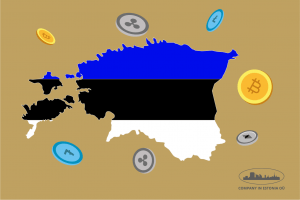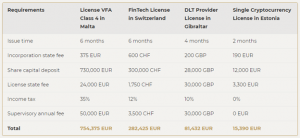What is The Most Profitable Country to Launch Your Cryptocurrency Project?
Disclaimer: The text below is an advertorial article that was not written by Cryptonews.com journalists.

The worldwide economy has been taken over by cryptocurrency, which is gaining more popularity. Also, cryptocurrency surpasses traditional paying methods due to its multifaceted advantages – availability, reliability, and independence. Over the past decade, with the rise in the number of virtual currencies, Europe has emerged as a starting point for cryptocurrency service providers and blockchain businesses. In 2018, several jurisdictions changed or created regulatory frameworks to apply the DLT (Distributed Ledger Technology).
In the comparative table, we examined the situation with the licensing of cryptocurrency activities of offshore jurisdictions, such as Switzerland, Gibraltar, Malta, and the regulation in Estonia.

Malta VS Estonia
Malta
In July 2018, Malta created the first-ever coherent regulatory framework for blockchain, consisting of the Malta Digital Innovation Law, the Law on Innovative Technologies and Services Law, and the most famous, the Virtual Financial Assets Law.
In theory, Maltese banks don’t open accounts for cryptocurrency startups without an appropriate license issued by the MFSA. Malta’s crypto-regulation, adopted under the 2018 Virtual Financial Assets Act, provides for four VFA service provider licenses:
- Class 1 – reception and transmission of services (investment consulting or P2P DEX).
- Class 2 – provision of VFA services (project portfolio management, P2P CEX).
- Class 3 – holding or controlling client funds (OTC trading platform).
- Class 4 – exchange of cryptocurrency and tokens (the only license allowing any VFA services).
While cryptocurrencies aren’t legal tender, they’re recognized by the Government of Malta as “a medium of exchange, unit of account or store of value”. There’re still no banks in Malta supporting the cryptocurrency business. Also, there’s no special legislation on the taxation of crypto companies, and currently, VAT doesn’t apply to transactions involving the exchange of fiat currency into cryptocurrency.
The authorities are doing everything possible to filter out potential virtual currency service providers and maintain a reputation as a reputable financial center, trying not to attract fraudsters from shady banks for many years. Hence follows an impressive price list for the acquisition of a license and many additional payments.
Estonia
One of the main reasons Estonia has become the dominant force in the European crypto-industry is the relatively low fees for obtaining the crypto license for exchange and digital wallet services.
The crypto asset industry is primarily based on the recently adopted Anti-Money Laundering (AML) and Combating the Financing of Terrorism (CFT). The amendments to the Law entered into force in March 2020, and as of July 2020, new requirements and stricter regulations were required. Although crypto-assets don’t have the same legal status as fiat currency, they’re allowed to be used as a means of payment and exchange.
In connection with the Money Laundering and Terrorist Financing Prevention Act, amendments have been made to establish stricter boundaries for companies applying for an Estonian crypto-license:
- The company must have a minimum share capital of 12,000 EUR.
- Must be paid a state fee of 3,300 EUR.
- Before applying, the company must have a corporate IBAN account with the European Electronic Money Institution.
- The Management Board and the place of business must be located in Estonia.
- The company must have a legal office in Estonia.
- The presence of an Estonian citizen Company Director is mandatory.
- After applying for a crypto-license, the KYC/AML officer must interview the RAB to confirm the skills and suitability for the position.
With a cryptocurrency license, the company has the right to legally provide a virtual currency wallet service and a virtual currency exchange service – in which the project client exchanges virtual currency for money or money for virtual currency or one virtual currency for another. In addition, licensed companies can issue their token created due to ICO and then sell it for FIAT money.
Outcome
Although Malta initially established itself as a leader in crypto-jurisdictions, the offshore has lost its dominance due to creating cryptocurrency structures from scratch and the tightening of regulation of crypto-activities. “Blockchain Island” turned out to be a pioneer in marketing rather than creating an enabling environment for the crypto business.
While on a global scale, Estonia has been chosen as the most favourable ecosystem for the formatting of cryptocurrency startups due to the 0% income tax rate. In addition, the following advantageous characteristics of formatting business in Estonia should be considered: minimal bureaucracy, digitalization of doing business, online company registration, and low administrative costs. The opportunity to obtain a cryptocurrency license in Estonia at the state level has been available since 2018, and more than 500 companies have already taken advantage of this.
Company Estonia OÜ will be happy to assist you in obtaining a license in the field of cryptocurrency, or in creating a Cryptocurrency Investment Fund.
{no_ads}



